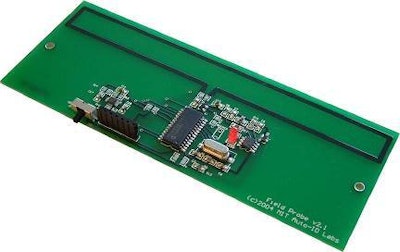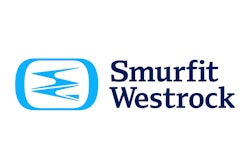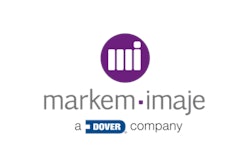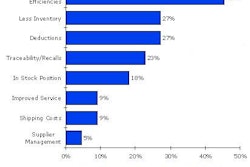
RFID Antenna exclusive: A project started in early 2004 at the Auto-ID Labs of the Massachusetts Institute of Technology, Cambridge, MA, resulted in a Class 1 Generation 1 RFID field probe last March that continues to be improved upon.
The field probe, which measures 9’’x3’’, integrates an Electronic Product Code RFID tag emulator and a sensor probe. The device is capable of reporting various sensor values continuously. By distributing multiple probes around a particular pallet configuration, the user can obtain instantaneous feedback as to the RFID field strength and signal quality. The version 1 device included a simple LED display that blinked at a rate proportional to the field strength of the signal. The latest version provides both visual and audio feedback of the RFID field strength.
What it has
The device features a semi-passive tag, power level detector and on-board battery. The battery permits the unit to send information at conditions below threshold levels that would activate typical tags.
“The battery allows measurements to be taken over greater distances and wider conditions than otherwise possible,” says project manager Rich Fletcher.
The device can be reconfigured to match different antenna designs. It operates in the 900 to 950 MHz frequency range and transmits the data back to an EPC reader. The device works in conjunction with 3-D modeling software that provides a graphical rendering of the field strength—a visualization of the electromagnetic performance of a real-world RFID system, according to research assistant Rich Redemske.
What it does
The RFID field probe can be used to help determine the best positioning for tags on a case as well as the “sweet spot” for antenna positioning to yield the highest number of good reads. It can also gauge interference from competing RF signals in the environment. In short, the field probe is a useful, multipurpose diagnostics tool.
Remarkably, the field probe is built using inexpensive parts. In fact, the parts cost less than $20.
The team has developed more than 100 of the field probes. They are working on a fourth generation of the device that will emulate a Generation 2 EPC Protocol that should be available mid-year.
Currently, to have access to the field probe and other related developments at the Auto-ID Labs, companies must be sponsors of the program. For 2005, sponsorship in the Auto-ID Packaging and RFID SIG (Special Interest Group) is $50ꯠ. Sponsoring companies are: Georgia-Pacific, Packaging Corp of America, Smurfit-Stone,
Yeun Foong Yu (one of the largest Taiwanese packaging companies, according to MIT), International Paper, Markem, Printronix, The Gillette Company, Kellogg's, Weyerhaeuser, and Philip Morris.
The team members involved are Rich Fletcher, project manager, packaging and RFID special interest group; Tom Scharfield, research manager; and Rich Redemske, Jonathan Wolk, and Uttara Marti, all research assistants.
The department head is Dan Engels, research director for Auto-ID Labs.
RFID Antenna asked if the Auto-ID Labs would provide field probes for sale. If such an effort made sense, Engels said it would involve a third-party vendor. They were also asked about any options for short-term contracted projects for companies apart from the $50ꯠ annual fee.
“That’s a great and interesting idea,” says Engels. “It’s something we would be capable of doing, once we are set up administratively.”
RFID Antenna expects to provide periodic updates of this and other projects of the RFID SIG at the Auto-ID Labs including some of the interesting findings the team has uncovered using the RFID field probe.
























